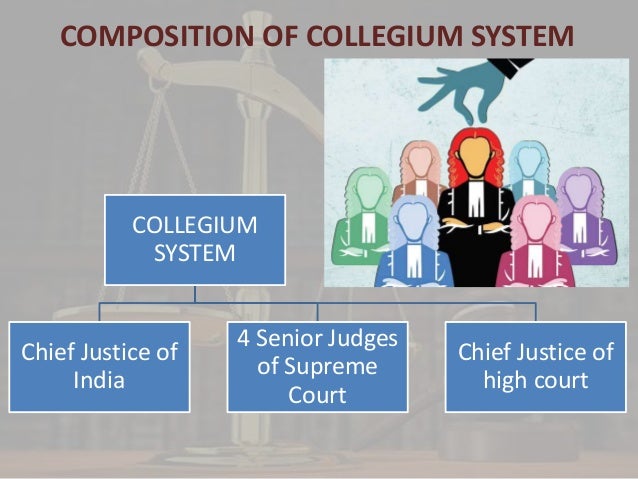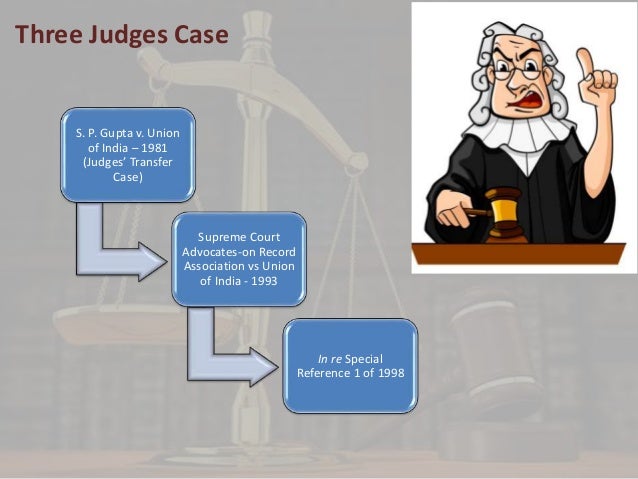WHAT IS COLLEGIUM SYSTEM?
The principal idea of this system is association of individuals of same rank. This system has been adopted by Indian judiciary around the year 1993 for the process of appointing and transferring the Supreme Court and High Court judges.
COLLEGIUM CONSISTS OF-
Image Courtesy: slidesharecdn.com
At present in India, the SC (Supreme Court) collegium consists of four senior most judges of the SC, Justice Rohinton Fali Nariman, Justice NV Ramana, Justice Uday Umesh Lalit and Justice Ajay Manikrao Khanwilkar led by CJI (Chief Justice of India) Justice SA Bobde. And the High Court collegium consists of four senior most judges of the court who would be led by the Chief Justice of the respective High Court, whereas the HC collegium could recommend the names of judges for appointment and transfer but the approval is made by the CJI and SC collegium. Additionally, for appointments to the high courts, the SC collegium must consult such other senior judges serving in the Supreme Court who had previously served as judges of the high court concerned. Thus, collegium system is popularly known as judges-selecting-judges system.
APPOINTMENT OF JUDGES IN INDIA BEFORE COLLEGIUM-
The SC was formed in the year 1950 from then till the introduction of collegium system, the constitutional provisions Article 124(2) and Article 217 guided the appointment of SC and HC judges respectively.Article 124(2) reads as follows: Every judge of the SC shall be appointed by the President after consultation with such of the judges of the Supreme Court and High Courts in the states as the President may deem necessary for the purpose and shall hold office until he attains the age of 65 years.
And Article 217 says, Every Judge of a High Court shall be appointed by the President after consultation with the CJI, the Governor of the state, and the Chief Justice of the High Court in case of appointment of a Judge other than the Chief Justice. In other cases, Judge shall hold office till he attains the age of 62 years. Later the interpretation to the term “consultation” in the above Articles introduced the existing system called collegium for the appointment of Judges.
HOW COLLEGIUM CAME TO EXISTENCE?
The collegium system does not have constitutional background. But with regard to constitutional provisions this system has been introduced through the three Judges case.
1st Case: SP Gupta vs. UOI (1982)
In this case, the supremacy of decision regarding appointment and transfer SC & HC Judges has been challenged. By interpreting Article 124 and Article 217, the Court held that the final decision maker would be the President, the term “consultation” did not refer concurrence. Hence the CJI can give his opinion but the president is not bound by his recommendation. Thus the supremacy of judiciary has been rebuffed in the process of appointment of the judges.
2nd Case: SC Advocates On Record Association vs. UOI (1993)
By overruling the decision in First Judges Case, the apex court devised the ‘Collegium System’ which redeemed the primacy to the CJI in matters of appointing and transferring the judges of HC & SC. Further highlighted that the term consultation could not curtail the ultimate role of the CJI. The CJI should make recommendations in consultation with his two senior most colleagues.
3rd Case: In re special reference 1 of 1998
This case gave an elaborate explanation to the term “consultation” under Article 143, whereby extended the members of collegium from two to four senior most colleagues in SC for the process of appointing judges, who would be headed by CJI.
RISE AND FALL OF NJAC
The dissension to the term consultation in the Indian Constitution dates back to 1977 wherein Sankalchand Sheth’s case, SC held that the term consultation never mean concurrence. But to strike a balance between the role of the executives and judiciary, SC ruled in this case that the CJI can give his opinion in transfer and appointment process of SC & HC Judges, the same should be accepted by the executive, only in exceptional circumstances the CJI’s opinion can be departed, in such cases, the executive’s decision would be subject to rigours of judicial review. But this sort of balance has been collapsed after the introduction of collegium system and this system has been mainly blamed for lack of transparency, this made the government to frame National Judicial Appointments Commission (NJAC) in the year 2014. The NJAC has been introduced by the 99th amendment of the constitution as a replacement for collegium system in August 2014, the NJAC amendment bill has been passed unanimously by the both houses of the parliament whereas the President assented it in December 2014.The amended Article 124A consist of NJAC members, who include:
- CJI (Chairperson)
- Two senior most SC judges
- The Union Minister of Law and Justice (ex- officio chairman)
- Two eminent persons (to be nominated by a committee consisting of the Chief Justice of India, Prime Minster of India and the Leader of Opposition)
Of the two eminent persons, one person would be from the SC/ST/OBC/minority communities or be a woman. The eminent persons shall be nominated for a period of three years and shall not be eligible for re-nomination. While appointing regular judges of the HC, the commission will also seek views in written from the Governor of the state, Chief Minister of the state, Chief Justice of concerned High Court. The members of NJAC have veto power in selection of other judges of SC and HC. The NJAC shall not recommend a person for appointment if any two of its members do not agree to such recommendation. The functions of NJAC described in Article 124B include recommending persons for appointment as CJI, SC Judges, CJ of HC and other judges of the High Courts. Further recommends the transfer for Chief Justices and other judges of the High Courts from one HC to any other High Court.
Soon after the commencement of NJAC in December 2014, has been struck down by the apex court in the year 2015. The NJAC act has been challenged on the ground that it is affecting the basic structure of constitution whereby violating the doctrine of separation of powers and the independence of judiciary. The Supreme Court Advocates on Record Association (SCAORA) and others who contended against NJAC has said that the constitution of the commission itself is unconstitutional since the veto power given to that eminent persons (who might not be having judicial knowledge) would perplex the decision made by the CJI. Considering this arguments, to uphold the fidelity of Indian constitution and to avoid the cumbersome process of appointment of the judges, promising certain amendments in the collegium system for its transparency, Justice JS Khehar with the five member constitution bench held that the NJAC act is unconstitutional and void with the majority 4:1.
CONCLUSION
After striking down the NJAC act, the apex court decided to publicise the decisions taken regarding appointment and transfer of judges through the collegium system to maintain the credibility and transparency. But considering the cases of A. Zakir Hussain and Dr. K. Arul, candidates nominated for elevation to the Madras High Court, the collegium has published reasons for their rejection stating, “Keeping in view the material on record, including the report of Intelligence Bureau [IB] he is not found suitable for elevation to the High Court Bench.” But the details of IB report and the apparent materials against rebuffing the nomination remain unpublished. Justice P.N. Bhagwati once said about collegium is that, “a sacred ritual whose mystery is confined only to a handful of high priests”. This statement remains constant till date for which further an example is the case of Vasudevan VN, a judicial member of the Income Tax Appellate Tribunal who was previously recommended by two different high court collegia, has been nominated later baffled, for which the SC collegium provided threadbare reasons that made the public to remain suspicious about the collegium system and the Indian judiciary. The judiciary is one of the three pillars of our constitutional framework, hence the apex court has to evolve to remove the opacity and to maintain the allegiance of the public towards the judiciary and the country.
REFERENCE
- Ravi Yadav, Quora, What is collegium system?
- The Constitution of India, bare act, AR Khan.
- AIR 1999 SC 1
- AIR 1982 SC 149
- AIR 1993 (5) SC 479
- Suhrith Parthasarathy, The Hindu, https://www.thehindu.com/opinion/lead/collegium-and-transparency/article19956961.ece
- Sudhanva Shetty, The Logical Indian, thelogicalindian/collegium.
- GK Today, currentaffairs.gktoday.in/tags/njac
- GK Today, 99th Amendment of Indian Constitution, 2014.
- Hemant Singh, Jagran Josh, general knowledge/jagran josh/how collegium works.
- Sivakumar, Hindustan Times, www.hindustantimes.com/india must evolve in the process of appointing judges.
- Ajit Prakash Shah, The Indian Express,indianexpress.com/article/opinion/columns/supreme-court-collegium-justice-maheshwari-khanna-5543778/


Comments
Post a Comment